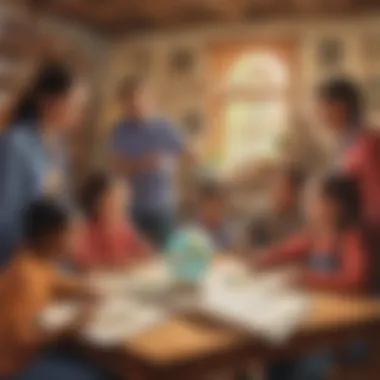Unveiling the Impact of Homeschooling on Social Studies Education: Strategies and Resources


Creative Activities
Homeschooling provides a unique opportunity for children to engage in creative activities that supplement their social studies education. By incorporating craft ideas into their learning, children can enhance their understanding of historical events and cultural perspectives. Parents can encourage children to create historical artifacts or maps that represent different civilizations, promoting hands-on learning experiences. Step-by-step guides can be utilized to ensure children follow instructions accurately and develop essential skills such as attention to detail and problem-solving. These creative activities not only make learning fun but also reinforce key social studies concepts in a tangible and memorable way.
Fun Quizzes
Engaging in fun quizzes can be a stimulating way for homeschooling students to reinforce their social studies knowledge. Covering topics ranging from ancient civilizations to modern geopolitics, these quizzes cater to diverse interests within the social studies domain. By incorporating various question types such as multiple-choice, true or false, and fill-in-the-blank, students can actively engage with the content and test their understanding. Through frequent participation in these quizzes, children can solidify their grasp of historical events, famous figures, and global issues, fostering a deeper appreciation for the complexities of the social studies discipline. Knowledge reinforcement is achieved through immediate feedback provided after completing each quiz, allowing students to identify areas for improvement and actively participate in their academic growth.
Fact-Based Articles
Themed around a wide array of social studies topics, fact-based articles serve as valuable resources for homeschooling families seeking to delve deeper into specific areas of interest. From exploring ancient civilizations to examining socio-political movements, these articles present information in an engaging and accessible manner tailored for young learners. Featuring interactive elements such as maps, timelines, and graphics, these articles captivate children's attention and encourage active participation in their learning journey. Additional resources, including links to related articles and external websites, empower parents and students to explore beyond the confines of the core curriculum, fostering a holistic understanding of social studies concepts and their real-world applications.
Introduction
In the realm of education, specifically in the domain of social studies, homeschooling plays a significant role in shaping the learning journey of students outside the conventional classroom environment. This section of the article aims to delve into the intricate relationship between homeschooling and social studies education, elucidating the unique challenges and opportunities that parents and students encounter in this alternative educational setting. By exploring how homeschooling impacts the understanding of social studies concepts, we can unravel the effective strategies and resources crucial for enhancing the social studies experience within homeschooling setups.
Understanding the Role of Homeschooling in Social Studies Education
Exploring the Definition of Homeschooling
Embarking on a quest to define homeschooling unveils a non-traditional approach to education where students are educated at home rather than in a formal school setting. This unconventional method offers parents the flexibility to tailor the educational experience according to their child's learning pace and preferences. Homeschooling's distinctive nature lies in its individualized attention and customized curricula, making it a compelling choice for families seeking a personalized and focused approach to education. However, the autonomy associated with homeschooling also poses challenges such as ensuring comprehensive coverage of academic subjects and social interactions.
Importance of Social Studies Education in Homeschool Curriculum


The inclusion of social studies education in homeschool curriculums holds immense significance due to its role in cultivating well-rounded individuals equipped with a profound understanding of society, politics, history, and geography. By integrating social studies, homeschooling fosters critical thinking, empathy, and cultural awareness in students, preparing them to navigate an increasingly globalized world. Despite these numerous advantages, challenges such as accessing diverse learning resources and incorporating interactive teaching methods emerge, necessitating innovative approaches to enrich social studies education within homeschool environments.
Challenges Faced in Teaching Social Studies at Home
Lack of Access to Diverse Learning Resources
One prevalent challenge in homeschooling social studies is the limited access to a wide array of learning materials and resources compared to traditional school settings. Navigating this constraint requires creativity and resourcefulness on the part of parents and caregivers to provide comprehensive and engaging social studies lessons. While online platforms and community resources offer valuable support, ensuring a holistic social studies education remains a constant juggling act for homeschooling educators.
Integration of Social Studies Across Subjects
Integrating social studies across various subjects in a homeschool curriculum presents both benefits and complexities. Connecting social studies with language arts, science, and mathematics enhances interdisciplinary learning and promotes a holistic understanding of societal issues. However, striking a balance between subject integration and maintaining the depth of social studies content poses a nuanced challenge for homeschool educators. By embracing innovative teaching approaches and collaborative learning opportunities, homeschooling parents can overcome these challenges and optimize the social studies learning experience for their children.
Effective Strategies for Teaching Social Studies in Homeschooling
In this article, exploring the arena of teaching social studies at home goes beyond idealistic musings. The significance of implementing effective strategies when educating children in social studies within a homeschooling environment cannot be overstated. It involves a nuanced approach to catering to individual learning styles, fostering critical thinking, and engaging students with real-world experiences to supplement traditional textbook learning. Writing about Effective Strategies for Teaching Social Studies in Homeschooling necessitates diving deep into the intricacies and considerations that parents and caregivers must bear in mind when crafting an enriching educational experience.
Utilizing Interactive Online Platforms for Social Studies Learning
The digital age has brought an array of interactive online platforms that revolutionize the landscape of education. Online learning tools offer unparalleled flexibility and accessibility, allowing students to engage with social studies concepts in dynamic and immersive ways. These tools not only supplement traditional teaching methods but also foster independent learning and critical thinking skills. Their ability to tailor content to individual learning paces and styles makes them an invaluable resource for homeschooling families seeking a comprehensive social studies curriculum. The benefits of online learning tools extend beyond mere convenience, empowering students to explore historical events, cultural norms, and societal structures through interactive modules and multimedia resources. While these tools come with their advantages, it is crucial for parents to ensure that screen time is balanced effectively with other forms of hands-on educational experiences to provide a well-rounded learning environment.
Benefits of Online Learning Tools
Despite initial skepticism towards online education, the benefits of integrating online learning tools into social studies curriculum are manifold. These tools offer a personalized learning experience, allowing students to progress at their own pace and revisit challenging concepts. They provide access to a wealth of resources, from virtual field trips to interactive timelines, enriching students' understanding of historical events and societal phenomena. The visual and auditory stimuli offered by online tools cater to diverse learning styles, making complex topics more digestible and engaging for students. Furthermore, the interactive nature of these tools encourages active participation and critical thinking, elevating the learning experience beyond rote memorization. Virtual simulations and collaborative activities foster a sense of connection and community among homeschooling students, offsetting the potential isolation of independent study. Integrating online learning tools into the social studies curriculum equips students with digital literacy skills essential for success in the 21st century.


Engaging Social Studies Apps and Websites
Incorporating engaging social studies apps and websites into the educational arsenal of homeschooling families adds a dynamic dimension to traditional learning. These platforms offer interactive features, curated content, and gamified elements that capture students' attention and make learning enjoyable. The immersive nature of social studies apps and websites transforms abstract historical events into tangible experiences, fostering empathy, critical thinking, and cultural awareness. Their visual appeal and interactive quizzes not only make learning fun but also reinforce comprehension and retention of key concepts. While the advantages of these tools are evident, parents must also be mindful of screen time management and ensure that the content aligns with educational goals and standards. By leveraging the innovations of modern technology, homeschooling educators can cultivate a rich and engaging social studies curriculum that sparks curiosity, cultivates analytical skills, and nurtures a lifelong love for learning.
Enhancing Social Studies Curriculum for Homeschooled Students
In this section, we delve into the intricacies of enhancing the social studies curriculum for homeschooled students, a crucial aspect in optimizing their learning experience. By tailoring the curriculum to suit individual learning styles, we ensure that each child receives personalized education that caters to their unique needs and capabilities. This customization not only fosters a deeper understanding of social studies concepts but also cultivates a sense of curiosity and engagement in the subject matter. By incorporating diverse teaching methods and resources, parents can create a stimulating learning environment that encourages active participation and critical thinking.
Customizing Social Studies Lessons to Suit Individual Learning Styles
When looking at adapting teaching methods to learning preferences, it is fundamental to acknowledge the varied ways in which students absorb information. By accommodating different learning styles such as visual, auditory, or kinesthetic, educators can effectively communicate complex concepts and ensure that each child grasps the material. This flexibility in teaching approaches not only promotes inclusivity but also empowers students to learn in a manner best suited to them, enhancing retention and comprehension.
Delving into exploring multisensory approaches, we uncover the power of engaging multiple senses in the learning process. By integrating hands-on activities, visual aids, and interactive simulations, students can fully immerse themselves in the subject matter, making learning more experiential and memorable. This multisensory approach not only caters to diverse learning preferences but also fosters creativity and critical thinking skills, enriching the overall educational experience.
Promoting Critical Thinking and Analytical Skills in Social Studies
Encouraging debates and discussions serves as a cornerstone in fostering critical thinking skills in social studies education. By engaging students in thought-provoking debates on historical events, societal issues, and cultural perspectives, educators stimulate analytical thinking and perspective-taking. This active participation not only deepens students' understanding of the subject but also hones their ability to think critically, evaluate evidence, and articulate informed opinions.
Utilizing primary source analysis plays a pivotal role in cultivating historical literacy and analytical skills in social studies. By examining primary sources such as documents, artifacts, and eyewitness accounts, students develop a deeper appreciation for historical context and interpretation. This hands-on approach not only enhances research skills but also encourages students to question sources, analyze biases, and draw evidence-based conclusions, fostering a nuanced understanding of historical events.
Navigating Social Studies Assessments in a Homeschool Setting
In the realm of homeschooling, navigating social studies assessments holds a crucial role. It serves as a vital tool to gauge the academic progress and comprehension levels of students in social studies. Assessments help both parents and educators understand the areas of strength and areas needing improvement in a child's social studies education. By monitoring and evaluating these assessments, homeschooling parents can tailor the curriculum to meet the specific needs and learning pace of each student. Additionally, assessments assist in tracking the effectiveness of teaching methods and materials utilized in the homeschool environment, ensuring a well-rounded social studies education.


Monitoring Progress and Achievement
Developing Assessment Criteria
The development of assessment criteria plays a pivotal role in ensuring an effective evaluation of students' understanding and skills in social studies. These criteria serve as the guidelines for designing assessments that align with the learning objectives and standards set for social studies education. By establishing clear and measurable assessment criteria, homeschooling parents can objectively assess students' performance and provide constructive feedback for improvement. Moreover, customized assessment criteria allow for the adaptation of assessments to suit the individual learning styles and preferences of students, fostering a tailored approach to social studies education.
Tracking Social Studies Proficiency
Tracking social studies proficiency involves monitoring students' overall competency and mastery of social studies concepts over time. Through continuous assessment and tracking of students' progress, parents can identify areas of growth and areas requiring further attention in social studies education. This systematic tracking enables parents to make informed decisions about adjusting curriculum strategies, introducing additional resources, or seeking external support to enhance students' social studies proficiency. Furthermore, tracking social studies proficiency provides an ongoing assessment of students' development of critical thinking skills, analytical abilities, and cultural awareness within the homeschooling environment.
Evaluating Social Studies Competencies
Assessing Research and Writing Skills
Assessing research and writing skills is an essential component of evaluating students' overall competency in social studies. This aspect focuses on measuring students' ability to gather information, analyze historical data, and communicate effectively through written narratives in the context of social studies topics. By assessing research and writing skills, parents can ascertain students' academic strengths and areas for improvement in conducting research, constructing arguments, and presenting findings cohesively. Additionally, evaluating research and writing skills enhances students' capacity to engage critically with historical sources, develop structured arguments, and articulate their perspectives on social studies issues.
Measuring Cultural Awareness
Measuring cultural awareness is a significant aspect of evaluating students' holistic understanding of social studies concepts. This evaluation assesses students' recognition and appreciation of diverse cultures, histories, and perspectives reflected in social studies curricula. By measuring cultural awareness, homeschooling parents can determine the extent to which students comprehend and respect cultural differences, historical contexts, and global perspectives inherent in social studies education. Developing cultural awareness fosters empathy, tolerance, and inclusivity, crucial aspects of a well-rounded social studies education that prepares students to navigate a diverse and interconnected world.
Conclusion
Reflecting on the Future of Social Studies Education in Homeschooling
Adapting to Changing Educational Trends
Embarking on a discussion about adapting to changing educational trends in the realm of homeschooling ushers in a new era of flexibility and agility. This specific aspect holds tremendous promise as it enables educators and parents to pivot seamlessly in response to dynamic educational paradigms. The key characteristic that defines adapting to changing educational trends is its capacity to foster adaptability and resilience in educational practices. This adaptive quality is vital in ensuring that homeschooling remains responsive to emerging educational methodologies, fostering a personalized and effective learning environment for students. Embracing this facet of educational evolution empowers homeschooling communities to evolve with the times, creating resilient educational ecosystems that nurture growth and development.
Embracing Innovative Teaching Practices
The realm of homeschooling is abuzz with the fervor of embracing innovative teaching practices, heralding a new dawn of educational exploration. At the heart of this approach lies a dedication to pioneering methodologies that push the boundaries of traditional teaching frameworks. The key characteristic of embracing innovative teaching practices is its penchant for fostering creativity and experimentation in educational delivery. This forward-looking stance not only enriches the learning experience but also cultivates a spirit of curiosity and exploration in students. Embracing innovation in teaching practices brings to the fore a unique feature of adaptability and relevance, ensuring that homeschooling remains at the forefront of educational advancement. While the advantages are manifold, including enhanced student engagement and enriched learning outcomes, there is a need to be mindful of potential challenges that may arise from rapid pedagogical transformations, underscoring the importance of balanced evolution in educational practices within the homeschooling sphere.







